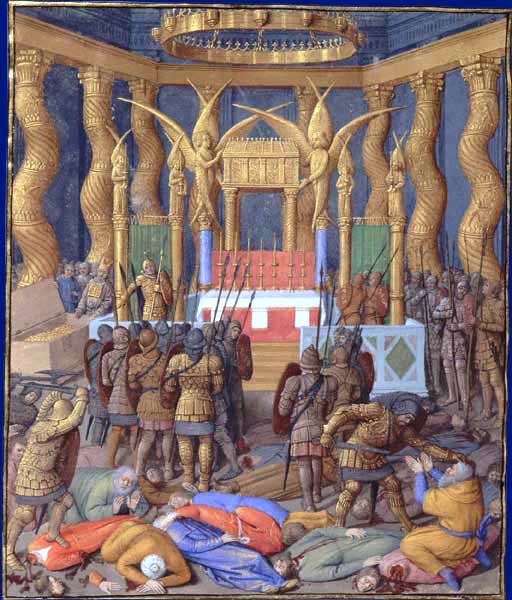Roman rule of the Jews
Carousel of images for this Bible Exhibit
Listen to this Bible Exhibit
In 63 BC, the Roman general Pompey was asked to intervene in a power struggle between rival Jewish factions of the Hasmonean dynasty vying for power. Pompey and his armies ultimately conquered Judea and laid siege to Jerusalem. Some twelve thousand Jews were massacred, and the city fell in three months. As a conqueror, Pompey marched into the temple and even into the Holy of Holies, violating all the Jews held sacred. The Jews were outraged at the defilement, but the Romans never fully understood why, causing great resentment between the two for the next almost two centuries.
The Romans ruled all of Judea throughout the time of the New Testament. After the death of Pompey, the Romans installed Herod the Great, an Idumean ruler, as the client king of Judea. Herod ruled from 37 BC until he died in 4 BC and implemented ambitious building projects, including expanding and renovating the Second Temple in Jerusalem. Herod’s descendants, known as the Herodian dynasty, continued to rule Judea as client kings with Roman support until AD 92.
Following the brutal reign of Herod Archelaus, Judea became a Roman province and was under direct Roman rule through prefects and then procurators. These officials, governing from Caesarea Maritime, were responsible for the province on behalf of the Roman Empire. The most notable prefect was Pontius Pilate, who ruled during Jesus’ crucifixion.
Around the year 62, between two Roman procurators, the high priest Annas II orchestrated the killing of James, the brother of Jesus Christ, who had been serving as a leader of the Jerusalem Church since approximately AD 50, and several other leading Christians. The church began to scatter north, making its new center in Pella.
The Great Jewish Revolt, also known as the First Jewish-Roman War, erupted in AD 66 and lasted until AD 73. The spark which ignited the conflict was the Roman Emperor Nero’s order to Florus, the procurator or governor of Judea at the time, to take seventeen talents from the temple treasury. The Roman army brutally suppressed the Jewish outcry and ignited open revolt. The Romans eventually crushed the rebellion, destroyed the Jewish Temple in Jerusalem, and killed and exiled many Jews from the region.
The Second Jewish War, known as the Bar-Kochba Revolt from AD 132 to AD 135, was the last major Jewish uprising against Roman rule. Led by Simon Bar-Kochba, it aimed to restore Jewish sovereignty in Judea. Despite initial success, the Romans ultimately suppressed the revolt, resulting in massive killing and widespread destruction, dispersing the remaining Jewish population.








